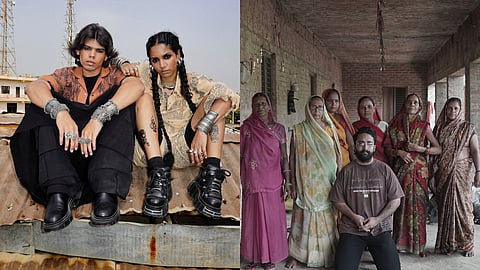
- HOMEGROWN WORLD
- #HGCREATORS
- #HGEXPLORE
- #HGVOICES
- #HGSHOP
- CAREERS
- ABOUT US
- CONTACT US

Zero Tolerance just unveiled Virasat, its Spring/Summer 2025 collection. The title translates to “inheritance” or “legacy,” but the collection doesn't feed into nostalgia. As the label itself insists, this is not a tribute. This is a continuation.
Where many brands glance at heritage only to strip it for surface aesthetics, Virasat roots itself in the lived practices of first-generation artisans. Century-old wooden blocks once held by royals form the skeleton of the prints. Algae-based dyes lend an ecological sharpness. Handspun, handwoven cotton shapes silhouettes that refuse industrial sameness. Every garment holds within it the labour, the rhythms of tools passed down.
Prakhar Rao co-founded Zero Tolerance in 2020. He has long rejected the notion that Indian fashion must “modernise” to prove itself on global stages. Instead, his work sees South Asian heritage as contemporary in its own right. From his debut collection Proud Browns to Karm in 2024, which spotlighted artisans as the essence of fashion, Rao has built a practice that is both research-led and politically charged.
This collection is a philosophy stitched into fabric. The lookbook was shot in the very places where the textiles were made: villages, workshops, dye pits. In collapsing the distance between craft and consumption, Zero Tolerance asks us to reckon with fashion’s human foundations.
Zero Tolerance, now co-led by Rao and co-founder Zeeshan Akhtar, stands apart in an industry that often pays lip service to sustainability. Their commitment to micro-batch production, fair wages, and circular processes translates into clothes that are political acts. To wear Zero Tolerance is to choose human touch over machine repetition.
Colonialism, as Rao reminds us, didn't only seize land, it stole style. By returning South Asian craft and textiles to the centre, Virasat is a reclamation. If the past decade of global fashion has often treated “heritage” as an aesthetic garnish, Zero Tolerance’s Virasat doubles down on it as marrow. The human hand, the political choice, the weight of legacy: these are the luxuries worth inheriting.
If you enjoyed reading this, here's more from Homegrown:
Madhu Kumari’s Graduate Collection Depicts A Personal Journey of Self-Liberation
The San Francisco Museum Of Modern Art Has Just Acquired A Unique Baiga Tattoo Typeface
Non-Residency: An Exhibition Where Indian Art History Meets Diasporic Re-Invention
